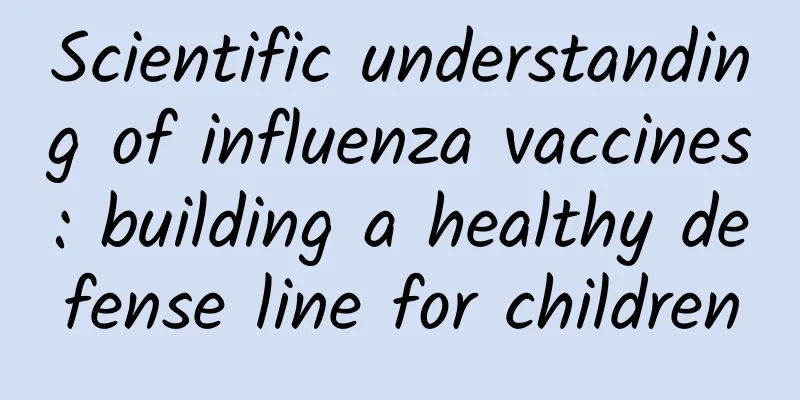Scientific understanding of influenza vaccines: building a healthy defense line for children

|
Author: Chen Yue, First Hospital of Jilin University Reviewer: Zhao Jie, Chairman of the Chinese Medical Association Clinical Pharmacy Branch, The First Affiliated Hospital of Zhengzhou University Chief Pharmacist Professor Children have weaker immunity and are more susceptible to influenza virus infection because their immune systems are not fully developed. The main symptoms of influenza in children include fever, cough, sore throat, muscle pain, fatigue, etc. At present, influenza vaccination is an effective means of preventing influenza. 1. The best preventive measure: flu vaccination Flu vaccination is an effective way to prevent influenza and reduce the risk of contracting influenza and developing serious complications. Taking anti-influenza virus drugs for preventive treatment cannot replace vaccination. It can only be used as an emergency temporary preventive measure for people with severe influenza who have not been vaccinated or have not yet gained immunity after vaccination. For children to receive the flu vaccine, what age is suitable for vaccination and when should it be vaccinated? Here are the answers for you. Figure 1 Copyright image, no permission to reprint It is recommended that babies aged ≥6 months receive annual influenza immunization. Currently, inactivated influenza vaccines have not been approved for use in infants under 6 months of age. Influenza vaccines are divided into trivalent and quadrivalent. The trivalent influenza vaccine mainly protects against three subtypes of influenza viruses, while the quadrivalent influenza vaccine adds an additional subtype. Therefore, if conditions permit, the quadrivalent influenza vaccine is generally preferred. Because the quadrivalent influenza vaccine can protect against more types of influenza viruses, it can theoretically provide better preventive effects. Current research data show that compared with trivalent and quadrivalent vaccines, there is no difference in the preventive effect of antibodies produced against common virus strains. Vaccine settings vary from place to place, so don't delay the best vaccination time in order to wait for the quadrivalent vaccine. It is recommended to get the vaccine that is available locally. See the table below for the specific differences between the two vaccines. Figure 2 Copyright image, no permission to reprint Influenza vaccination time: Generally, it is carried out in September or October every year. Because influenza is a respiratory infectious disease in winter and spring, and the body takes about two weeks to produce effective antibodies after vaccination, we should try to get vaccinated 1 to 2 months before the influenza epidemic, so as to play an effective preventive role before the influenza occurs. 2. Precautions when receiving influenza vaccine Figure 3 Copyright image, no permission to reprint 1. For infants and young children aged 6 to 23 months, the risk of developing severe illness after contracting influenza is high and the burden of influenza hospitalization is heavy, so influenza vaccination should be given priority. 2. Existing influenza vaccines cannot be directly administered to infants under 6 months of age. Influenza can be prevented by vaccinating the mother during pregnancy and by vaccinating family members or caregivers. 3. If a child is ill, it is not recommended to get vaccinated, as this will worsen the illness. The child should wait until he or she has fully recovered from the illness before getting vaccinated. 4. Because the influenza virus is highly variable, the protection duration after influenza vaccination does not exceed 1 year, so it is best to get a influenza vaccine once in October every year. 5. If you are taking medication or have received other vaccines recently, you should tell your doctor before getting the flu vaccine; you can get the flu vaccine while taking anti-influenza virus drugs for prevention and treatment. 6. After the vaccination, you should stay at the vaccination site for observation for 30 minutes before leaving. 3. What details should we pay attention to in our daily life to prevent influenza? 1. Influenza vaccine is the most effective means of preventing influenza, and the vaccine can be administered in advance during the peak influenza season. 2. Pay attention to personal hygiene, wash your hands frequently, wear a mask when going out, and cover your mouth and nose with a tissue when sneezing. 3. Keep the indoor environment clean and ventilate frequently. 4. Avoid going to crowded places during the peak of influenza season. 5. Enhance your own immunity, such as increasing nutrient intake, exercising appropriately, etc. Figure 4 Copyright image, no permission to reprint |
<<: Don’t underestimate the “mole” on the sole of your foot!
>>: Protect your heart health and stay away from coronary heart disease
Recommend
Menstrual flow is too little or almost nothing
When women have less menstrual flow, it will caus...
What are the reasons for irregular menstruation after abortion?
There are many women who, for various reasons, ha...
Can I lose weight after miscarriage? What are the hazards and precautions?
Can I lose weight after miscarriage? The postpart...
Why does bougainvillea never bloom? How can I make it bloom?
Bougainvillea is loved by people for its gorgeous...
What is vulvar itching?
Symptoms of pain and itching in the vulva are mos...
What causes vomiting during menstrual cramps?
Women are very uncomfortable with abdominal pain ...
How many false labor contractions a day are normal in late pregnancy?
False labor will not cause pain, which is the opp...
Will eating too much solid calcium cause kidney stones? The main cause of kidney stones is...
Author: Li Jie, attending physician, Department o...
Special causes of lower limb ulcers-arteriovenous fistula
This is the 5237th article of Da Yi Xiao Hu There...
How many days should I take anti-inflammatory drugs for colposcopy biopsy?
Colposcopic biopsy is actually a very common meth...
How to regulate menstruation a week early
Menstruation is a physiological phenomenon that o...
What happens if I haven’t had my period for 40 days?
If your period does not come on the day it is sup...
Maca's effects and functions on women
Maca is not only suitable for men with kidney def...
Having sex 16 hours before ovulation for a boy
Nowadays, most young people pay attention to euge...









